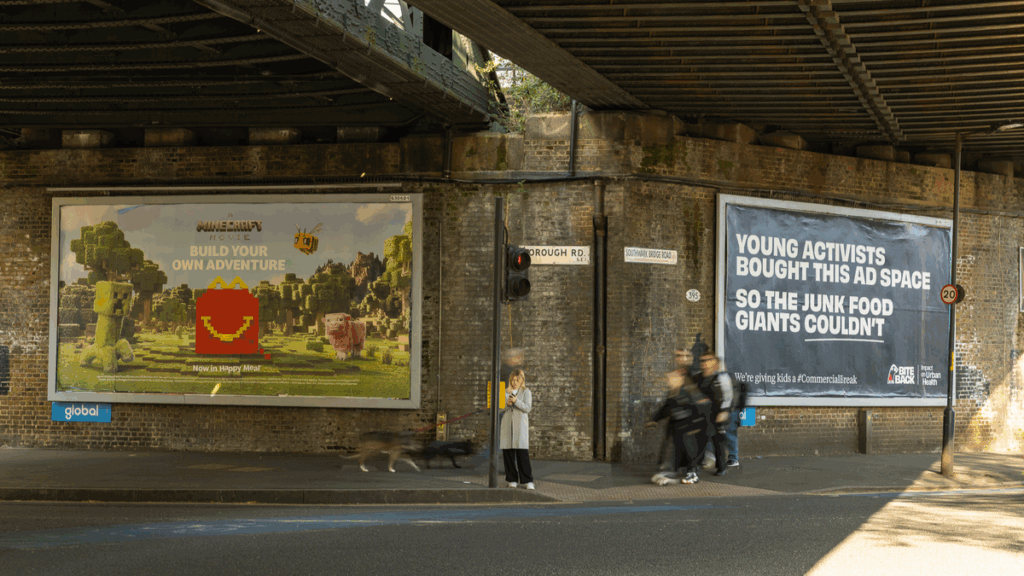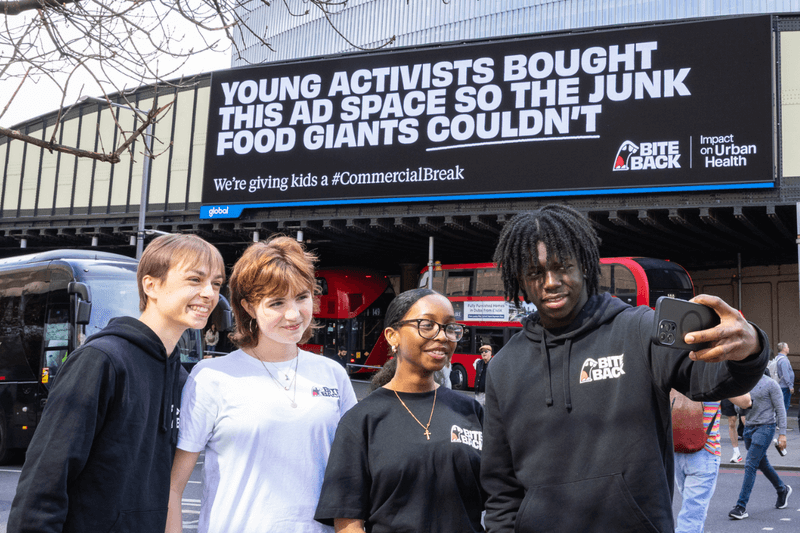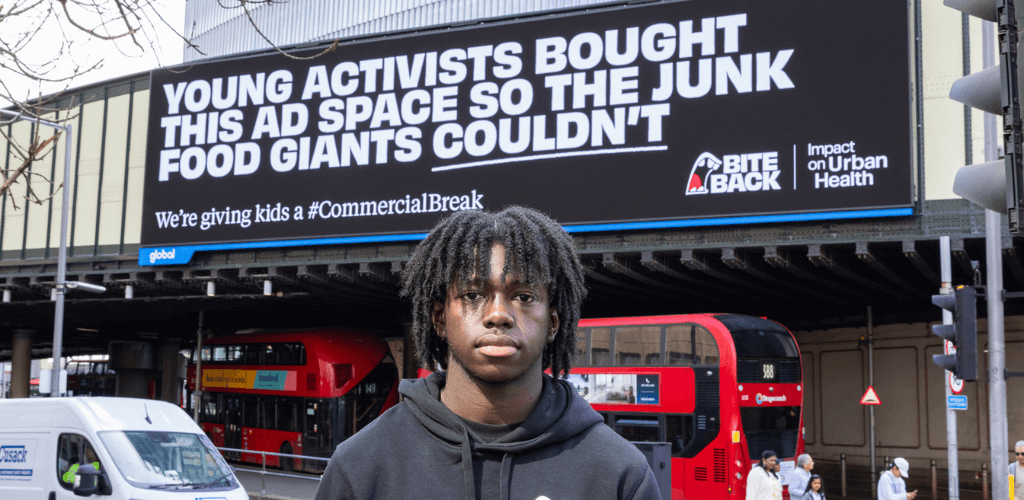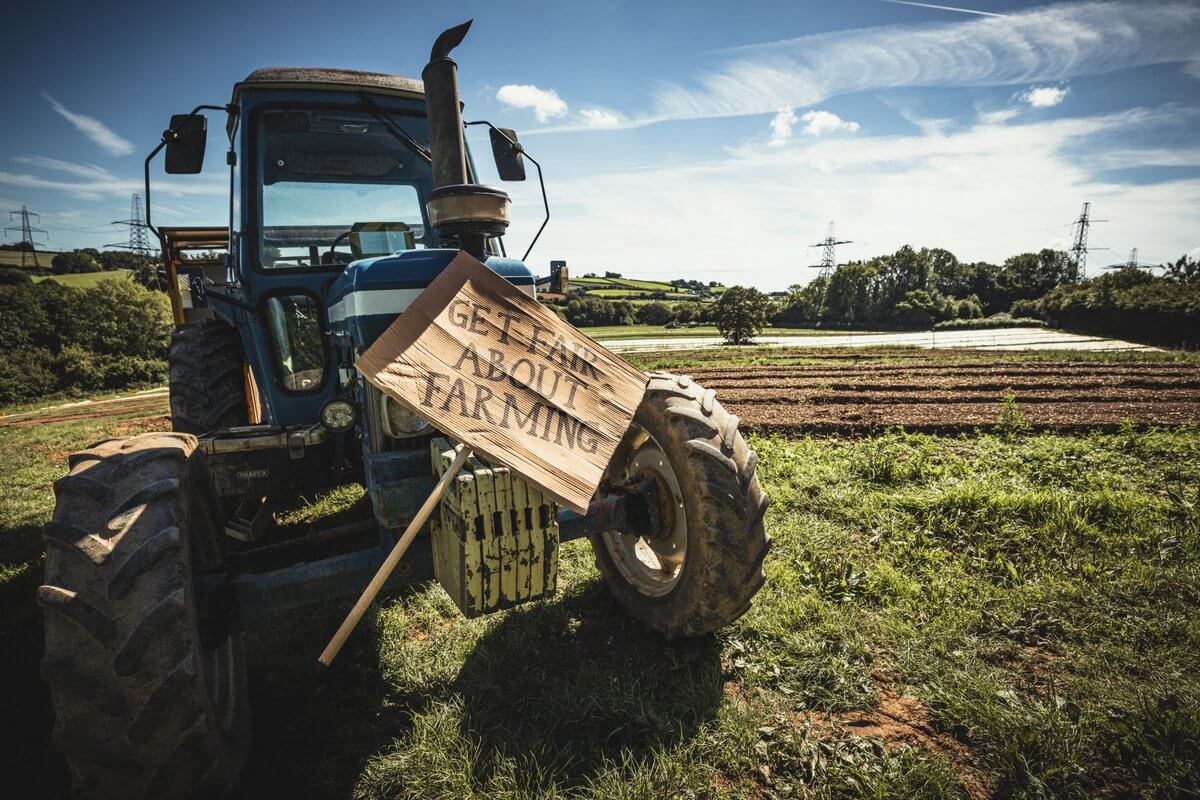In April, young campaigners sought to take over South London on-street ad sites with the message: “Young Activists Bought This Ad Space So Junk Food Giants Couldn’t.”

The move was part of the #CommercialBreak campaign led by Bite Back – a youth-led movement campaigning to change the way unhealthy food is made, marketed, and sold, especially to children. “Unhealthy food adverts are everywhere, smacking us in the face,” Rory Gibson, brand development manager at Bite Back, tells Wicked Leeks.
Indeed, with the help of researchers at the University of Liverpool, the activists showed how major food and drink brands are saturating the UK’s most underserved communities with adverts for unhealthy products.
“Everywhere I look, there’s an advert for unhealthy food and drink — on my high street, at the bus stop, on billboards near my school or college,” said Yacub from Bite Back. “We’ve had enough.”
Buying the ad space previously used by companies like McDonald’s, KFC, Coca-Cola, and Red Bull, was bold and brave, as well as above board: for example, it passed all regulatory checks with the Committee of Advertising Practice (CAP), the marketing watchdog.
And yet last month their carefully laid plans came to a shuddering halt, with the campaign pulled from billboards and bus stops as media owners issued blanket refusals to run them anymore. The reason? The campaign apparently featured ‘political messaging’.
Bite Back smelled a rat. As 17-year-old Farid, from Manchester, explained: “I can’t believe we’ve just collected [the Sheila McKechnie] award for our work — and already the industry is trying to silence us. We broke no rules or regulations,” he added. “If they didn’t think our message mattered, they wouldn’t try so hard to keep it out of sight.”
Indeed. Though the campaign operated on a fraction of the budgets available to the food giants when it comes to outdoor advertising, it had clearly struck a nerve.
Back fired
The campaign had originated from discussions across the group’s youth board – made up of 70 young activists – about the pervasive nature of fast food marketing, aimed firmly at children and young people. “From the moment we’re born, we are surrounded by junk food. It’s everywhere — on our streets, screens, and school,” reads the Bite Back website.
Their latest campaign was months in the making, designed to shine a light on just how pervasive junk food advertising is. “Young people want tasty, healthy, and affordable options. They want the healthy option to be the default,” says Gibson.
That is far from the case. From the brightly-coloured packaging that’s (strategically) sited at eye-line for a 6-year-old in supermarkets, to the bus stops where older children wait for their lift to school, and all those billboards on our high streets, junk food adverts are impossible to ignore. Ads for healthy options are almost as difficult to spot.
Indeed, Bite Back’s analysis of ad spend data showed that in 2024, food and drink companies spent over £400m on street advertising. The top 10 spenders included McDonald’s, PepsiCo, KFC, Coca-Cola, Mars, Mondelēz and Red Bull.

These ads are not just widespread – they are heavily concentrated in the most underserved communities, where junk food adverts appeared at six times the rate per kilometre compared to the least disadvantaged areas, the group found.
“We wanted to hold a mirror up to the tactics of these junk food giants, who continue to absolve themselves from blame,” Gibson continues.
A noisy way to silencing
Unfortunately, Gibson and the team were not given that opportunity. The Friday before the campaign was due to go live one of the major media companies said they were not going to run the adverts and refunded Bite Back’s money. The campaign’s reach was “cut in half”, Gibson says.
At least it was in terms of exposure on outdoor advertising space. The story of the campaign being thwarted by the food and media behemoths actually created quite a social media storm. “The traction we gained online was incredible,” Gibson tells us. “It turned out to be one of the biggest moments we have had. Help also came in from businesses offering window space and small media companies offering us space for free.”
All the while the likes of Global and JCDecaux — two of the UK’s advertising giants who are estimated to control around 70% of the country’s digital outdoor ad impressions – stayed quiet. Nicki Whiteman, interim CEO at Bite Back, said this left her feeling that the refusals were “less like coincidence and more like an industry that wants to conceal the role it plays in harming children’s health”.
Gibson countered the ‘political messaging’ argument, which left him and the team confused: this was a youth message. This was young people explaining what they want to see,” he adds.
Bite Back does however have a message to politicians – one it has been replaying over and over again. The youth activists have long campaigned (as others have too) for the removal of high fat, salt, and sugar (HFSS) advertising from public spaces, citing its direct link to food-related illness. Right now, over a third of 10/11-year-olds leave primary school in England at risk of food related ill-health in their future, including type 2 diabetes and heart disease — in part due to a constant exposure to unhealthy food marketing, the campaigners note.
Advertising restrictions have been delayed four times across four different governments, Gibson explains, so implementing these would be a “great start” for Labour, which has of late been talking a good game in improving access to healthy, affordable, sustainable food but is yet to really act with any new rules or policies.
Whether the government steps in, or the industry giants keep trying to step on them, there is more bark left in Bite Back yet. “We want to shift the narrative,” Gibson says. They already have.













This is TOTALLY INSPIRING!! Time to spread the word!! (And I, for one, will!!)
Meanwhile, I’ll add, there is a movement happening on Planet Earth right now – many many people are ‘coming alive’ and realising that the battle is on and that it’s OK to stand up and be counted!! In fact, it’s more than OK – the time has come for ordinary people to realise that we have a responsibility to stand up and be counted so – “We, the people, need to make our voice heard and overcome the corporations and the life of ‘Profit over People’ that runs the show at the moment!! Thank You Young People. You have my personal support and hopefully many others will join you!! Hopefully young people will have the energy and the ideas and older people will share their wisdom We can work together to achieve change!!
An informative explanation: It’s the year of the snake in Chinese astrology – a year of intelligence and wisdom. Actually, even more information; it’s the year of the wood snake and that only happens once every sixty years. An aspect of the snake is that it sheds its skin and then uncovers a whole new appearance. The last time it was ‘the year of the wood snake’ was 1965 and that year Bob Dylan played at Newport, helping to spark a whole new movement that was shortly followed by the Summer of Love. 1965 marked a turning point in American history. In Selma, Alabama, Martin Luther King Jr. led civil rights demonstrators on a series of marches pushing the passage of the Voting Rights Act of 1965. These marches were organized to protest the blocking of Black Americans’ right to vote. In Vietnam, the war escalated, as President Johnson instituted continuous air strikes. The United States occupied the Dominican Republic, Malcolm X was assassinated, NASA’s Mariner 4 flew by Mars, race riots erupted in Watts, California, and Muhammad Ali defeated Sonny Liston. In the UK the Murder Act of 1965 was given Royal assent, which formally abolished the death penalty. Prisoners were given life sentences instead. 70 miles per hour speed limits were imposed on British roads. The government announced plans to introduce blood alcohol limit on drivers in a clampdown on drink driving.
So, this time around, for 2025, let’s make some real changes. Let’s fight for healthy lives. Let’s take back control. We, the people, can encourage each other, work WITH Mother Nature and help SAVE THE PLANET!!!
These young people are wonderful.
It is about time something was done about the food industry. It will be a difficult nut to crack, but we have to start somewhere.
The government are planning to implement an easier way for people to make healthier choices, but how they will do this and what the success rate will be, remains to be seen. I do wonder how serious the government is, when they are allowing another 500 KFC outlets to open across the UK.
Time will tell.
All the best to Bite Back. You have my full support and.I hope it spreads.
I’m not plugged in to social media but I was delighted to read that it came to the rescue of this, possibly wimpish, behaviour by the advertising giants. Let’s hope the news story, quite rightly, takes on a bigger momentum as a result. Well done Bite Back. Keep it up.